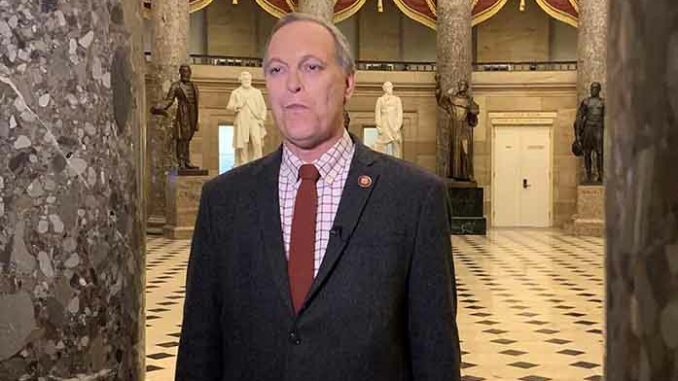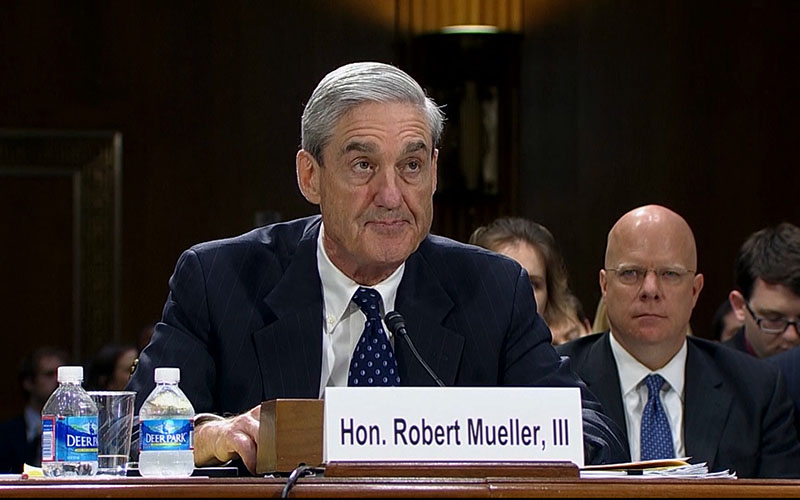
WASHINGTON – Arizona lawmakers’ reactions to the report on the Mueller investigation were much like the summary itself – open to interpretation depending on which side of the aisle was talking and far from the last word on the topic.
While Democrats demanded that the full report be made public, most Republicans echoed President Donald Trump’s claim that he was “completely exonerated” by the report on the almost two-year investigation into possible Russian meddling in the 2016 elections.
And some, like Rep. Andy Biggs, R-Gilbert, joined the president’s call to turn the tables and investigate the investigation.
“Fired FBI Director James Comey and others responsible for instigating this farcical investigation for the sole purpose of undermining President Trump must be prosecuted,” Biggs wrote in an op-ed for Fox News.
But Biggs also said the report “must be fully released, and those who abused their power must be brought to justice if the political divisions in this country are ever to be healed.”
Release of the report was one area where most Democrats and Republicans were in agreement Monday, but for different reasons. Rep. Ann Kirkpatrick, D-Tucson, called on Attorney General William Barr to release “every word” of Special Counsel Robert Mueller’s report.

“AG Barr shared a letter reviewing it, but I look forward to seeing the entire report, every word,” Kirkpatrick said in a tweet Sunday. “The American people should also be able to examine it fully.”
Mueller’s report was delivered Friday to Barr, who sent a four-page summary of its principal findings to Congress on Sunday. Barr said it is his “goal and intent” to release as much of the report as possible, but that parts – like classified information, grand jury testimony or details of ongoing investigations – cannot be released and that he is still reviewing the document.
Barr’s summary covers a massive report, spanning 22 months of work by 19 attorneys, 40 FBI agents and analysts, who issued 2,800 subpoenas and 500 search warrants and interviewed about 500 witnesses. It has already resulted in convictions of several people connected to the Trump campaign, and spun off other investigations.
But Barr said Mueller concluded that, while there were certainly Russian attempts to influence the election by hacking Democratic computers and through social media disinformation, there was no evidence that anyone with the Trump campaign “conspired or coordinated with the Russian government … despite multiple offers from Ruddian0-affiliated individuals to assist the Trump campaign.”
The report is not so clear on the question of whether Trump attempted to obstruct the investigation, by firing Comey, threatening others and suggesting possible pardons for witnesses in the case. Barr said while Mueller’s report “does not conclude that the President committed a crime, it also does not exonerate him” of obstruction charges.
That call was left to Barr and Deputy Attorney General Rod Rosenstein, who determined that none of the actions in the report amounted to “obstructive conduct” with a link to “pending or contemplated proceeding, and were done with corrupt intent” – all three of which would have to be shown to win an obstruction conviction.
That amounted to a “complete exoneration” for Arizona Republican lawmakers, and a feeling among Democrats that the summary report wasn’t enough to close the books yet on the issue.
“A brief summary to Congress isn’t enough, and the American people deserve to know the full findings of the Special Counsel,” Rep. Raul Grijalva, D-Tucson, said in a tweet Sunday.
Democratic chairs of six House committees have already written to Barr, demanding that he turn over the full report within a week. But Sen. Martha McSally, R-Arizona, looked at the summary and said it’s time to move on from the investigation.
-Cronkite News video by Alyssa Klink
“I am glad to see Special Counsel Mueller’s investigation reach its long overdue conclusion that has wasted time and energy on issues that have made our country more divisive,” she tweeted. “Now that we close this chapter, I hope that as a nation we can focus on issues that move us forward.”
Rep. Ruben Gallego, D-Phoenix, lashed out at Rep. Dan Crenshaw, R-Texas, who suggested that Democrats had been “exposed” by the Mueller findings.
“Trump literally asked the Russians to get the emails on camera,” Gallego tweeted. “They had secret meetings with Russians that they lied about, let alone telling the Russian ambassador that he fired Comey because of the investigation.
“Wait for the report to come out before you get on a high horse,” Gallego said.
But Rep. Debbie Lesko, R-Peoria, said Barr’s summary of the findings “confirm that there is no evidence of collusion or obstruction. This investigation is over.” Her statement said Democrats need “to put aside their partisan investigations so that our country can move forward and work together to address the real issues facing the American people.”
That was echoed by Rep. Paul Gosar, R-Prescott, who called the investigation a waste of money. “22 months and millions of taxpayer dollars later and the Mueller investigation is finally done,” he said in a tweet. “No collusion. No obstruction.”
But Rep. Greg Stanton, D-Phoenix, said the summary report “raises more questions that deserve to be answered for the American people.”
“These questions can only be answered by releasing the Special Counsel’s full report and its underlying evidence,” he tweeted Sunday.
